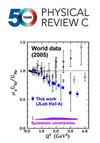横向动量谱的流体速度
IF 3.4
2区 物理与天体物理
Q2 PHYSICS, NUCLEAR
引用次数: 3
摘要
我们表明,在核-核碰撞的理想流体动力学模拟中计算的动量分布是由流体的横向速度分布近似确定的。我们计算了最符合$\sqrt{s_{\rm NN}}=2.76$ TeV下Pb+Pb碰撞实验数据的流体速度分布。我们获得了$p_t\sim 6$ GeV的合理拟合,远远超出了流体力学通常应用的范围。然而,合身并不完美,即使在低$p_t$。我们实际上认为,理想的流体力学计算不可能同时适合所有已确定的粒子谱,而不考虑具体的实现。特别地,数据显示在低$p_t$下有大量的介子,讨论了其物理解释。数据还显示,随着碰撞的中心位置越来越小,流体速度的分布也越来越广。这种展宽是由逐个事件的流体力学计算来解释的,它是由初始状态波动的中心性依赖造成的。本文章由计算机程序翻译,如有差异,请以英文原文为准。
Fluid velocity from transverse momentum spectra
We show that the momentum distributions calculated in ideal hydrodynamic simulations of nucleus-nucleus collisions are determined, to a good approximation, by the distribution of the transverse velocity of the fluid. We compute the fluid velocity distribution that gives the best fit to experimental data on Pb+Pb collisions at $\sqrt{s_{\rm NN}}=2.76$ TeV. We obtain reasonable fits up to $p_t\sim 6$ GeV, much beyond the range where hydrodynamics is usually applied. However, the fit is not perfect, even at low $p_t$. We actually argue that an ideal hydrodynamic calculation cannot fit simultaneously all identified particle spectra, irrespective of the specific implementation. In particular, data display a significant excess of pions at low $p_t$, whose physical interpretation is discussed. Data also show that the distribution of the fluid velocity becomes broader as the collision becomes less central. This broadening is explained by event-by-event hydrodynamic calculations, where it results from the centrality dependence of initial state fluctuations.
求助全文
通过发布文献求助,成功后即可免费获取论文全文。
去求助
来源期刊

Physical Review C
PHYSICS, NUCLEAR-
CiteScore
5.80
自引率
35.50%
发文量
863
期刊介绍:
Physical Review C (PRC) is a leading journal in theoretical and experimental nuclear physics, publishing more than two-thirds of the research literature in the field.
PRC covers experimental and theoretical results in all aspects of nuclear physics, including:
Nucleon-nucleon interaction, few-body systems
Nuclear structure
Nuclear reactions
Relativistic nuclear collisions
Hadronic physics and QCD
Electroweak interaction, symmetries
Nuclear astrophysics
 求助内容:
求助内容: 应助结果提醒方式:
应助结果提醒方式:


